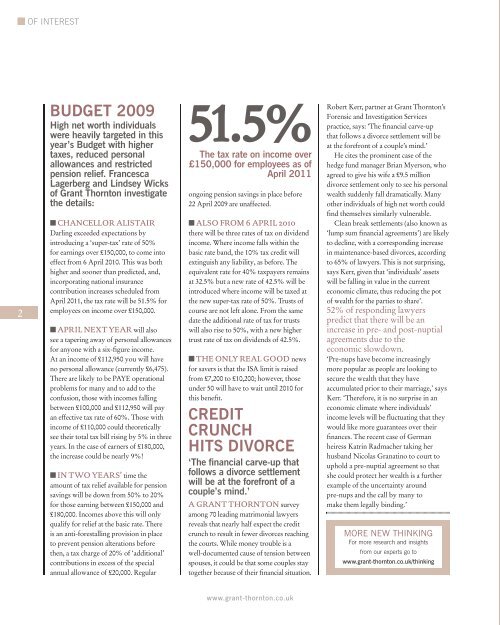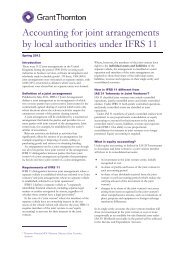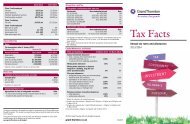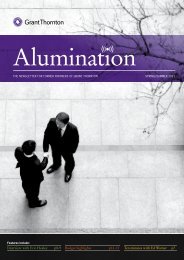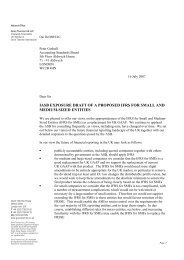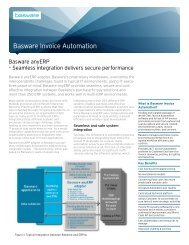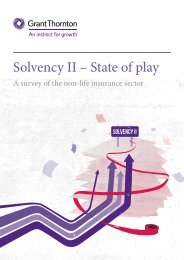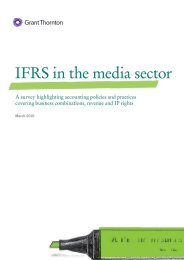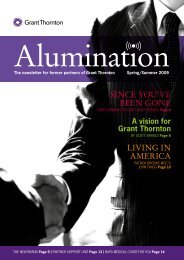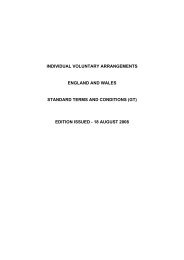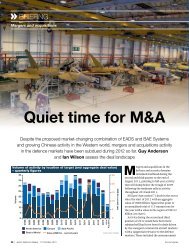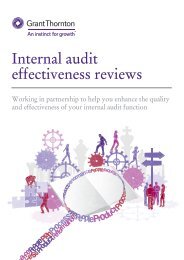Bespoke â Grant Thornton
Bespoke â Grant Thornton
Bespoke â Grant Thornton
You also want an ePaper? Increase the reach of your titles
YUMPU automatically turns print PDFs into web optimized ePapers that Google loves.
OF INTEREST<br />
2<br />
BUDGET 2009<br />
High net worth individuals<br />
were heavily targeted in this<br />
year’s Budget with higher<br />
taxes, reduced personal<br />
allowances and restricted<br />
pension relief. Francesca<br />
Lagerberg and Lindsey Wicks<br />
of <strong>Grant</strong> <strong>Thornton</strong> investigate<br />
the details:<br />
■ CHANCELLOR ALISTAIR<br />
Darling exceeded expectations by<br />
introducing a‘super-tax’ rate of 50%<br />
for earnings over £150,000, to come into<br />
effect from 6April 2010. This was both<br />
higher and sooner than predicted, and,<br />
incorporating national insurance<br />
contribution increases scheduled from<br />
April 2011, the tax rate will be 51.5% for<br />
employees on income over £150,000.<br />
■ APRILNEXTYEAR will also<br />
see atapering away of personal allowances<br />
for anyone with asix-figure income.<br />
At an income of £112,950 you will have<br />
no personal allowance (currently £6,475).<br />
There are likely to be PAYE operational<br />
problems for many and to add to the<br />
confusion, those with incomes falling<br />
between £100,000 and £112,950 will pay<br />
an effective tax rate of 60%. Those with<br />
income of £110,000 could theoretically<br />
see their total tax bill rising by 5% in three<br />
years. In the case of earners of £180,000,<br />
the increase could be nearly 9%!<br />
■ IN TWOYEARS’ time the<br />
amount of tax relief available for pension<br />
savings will be down from 50% to 20%<br />
for those earning between £150,000 and<br />
£180,000. Incomes above this will only<br />
qualify for relief at the basic rate. There<br />
is an anti-forestalling provision in place<br />
to prevent pension alterations before<br />
then, atax charge of 20% of ‘additional’<br />
contributions in excess of the special<br />
annual allowance of £20,000. Regular<br />
51.5%<br />
The tax rate on income over<br />
£150,000 for employees as of<br />
April 2011<br />
ongoing pension savings in place before<br />
22 April 2009 are unaffected.<br />
■ ALSO FROM 6APRIL 2010<br />
there will be three rates of tax on dividend<br />
income. Where income falls within the<br />
basic rate band, the 10% tax credit will<br />
extinguish any liability, as before. The<br />
equivalent rate for 40% taxpayers remains<br />
at 32.5% but anew rate of 42.5% will be<br />
introduced where income will be taxed at<br />
the new super-tax rate of 50%. Trusts of<br />
course are not left alone. From the same<br />
date the additional rate of tax for trusts<br />
will also rise to 50%, with anew higher<br />
trust rate of tax on dividends of 42.5%.<br />
■ THEONLYREALGOOD news<br />
for savers is that the ISA limit is raised<br />
from £7,200 to £10,200; however,those<br />
under 50 will have to wait until 2010 for<br />
this benefit.<br />
CREDIT<br />
CRUNCH<br />
HITS DIVORCE<br />
‘The financial carve-up that<br />
follows adivorce settlement<br />
will be at the forefront of a<br />
couple’s mind.’<br />
AGRANTTHORNTON survey<br />
among 70 leading matrimonial lawyers<br />
reveals that nearly half expect the credit<br />
crunch to result in fewer divorces reaching<br />
the courts. While money trouble is a<br />
well-documented cause of tension between<br />
spouses, it could be that some couples stay<br />
together because of their financial situation.<br />
Robert Kerr,partner at <strong>Grant</strong> <strong>Thornton</strong>’s<br />
Forensic and Investigation Services<br />
practice, says: ‘The financial carve-up<br />
that follows adivorce settlement will be<br />
at the forefront of acouple’smind.’<br />
He cites the prominent case of the<br />
hedge fund manager Brian Myerson, who<br />
agreed to give his wife a£9.5 million<br />
divorce settlement only to see his personal<br />
wealth suddenly fall dramatically.Many<br />
other individuals of high net worth could<br />
find themselves similarly vulnerable.<br />
Clean break settlements (also known as<br />
‘lump sum financial agreements’) are likely<br />
to decline, with acorresponding increase<br />
in maintenance-based divorces, according<br />
to 65% of lawyers. This is not surprising,<br />
says Kerr,given that ‘individuals’ assets<br />
will be falling in value in the current<br />
economic climate, thus reducing the pot<br />
of wealth for the parties to share’.<br />
52% of responding lawyers<br />
predict that there will be an<br />
increase in pre- and post-nuptial<br />
agreements due to the<br />
economic slowdown.<br />
‘Pre-nups have become increasingly<br />
more popular as people are looking to<br />
secure the wealth that they have<br />
accumulated prior to their marriage,’ says<br />
Kerr.‘Therefore, it is no surprise in an<br />
economic climate where individuals’<br />
income levels will be fluctuating that they<br />
would like more guarantees over their<br />
finances. The recent case of German<br />
heiress Katrin Radmacher taking her<br />
husband Nicolas Granatino to court to<br />
uphold apre-nuptial agreement so that<br />
she could protect her wealth is afurther<br />
example of the uncertainty around<br />
pre-nups and the call by many to<br />
make them legally binding.’<br />
MORE NEW THINKING<br />
For more research and insights<br />
from our experts go to<br />
www.grant-thornton.co.uk/thinking<br />
www.grant-thornton.co.uk


